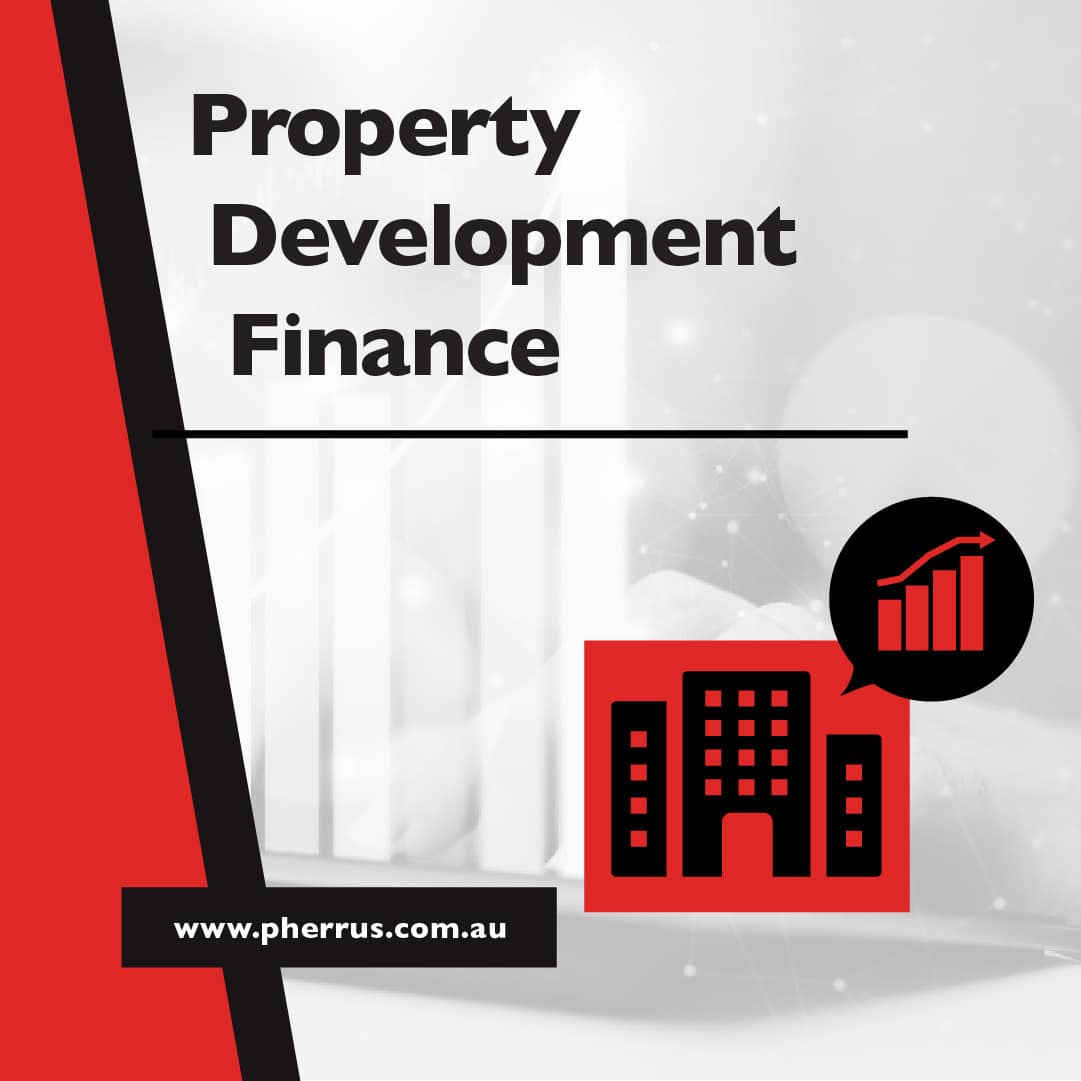The first step to getting a new property development off the ground is to ensure the project is properly financed.
Many developers, particularly inexperienced ones, underestimate how much capital they need, which can result in costly delays and project overruns.

In this article, we are going to explore finance for property development.
We’ll discuss what property development finance is, how to finance property development and how property development finance works.
We’ll also answer a few common questions we get asked by developers.

What is Property Development Finance in Australia?
In short, property development finance is a type of finance that is used to fund speculative property developments.
This type of funding is complex and can include several types of loans such as bridging loans, lines of credit and commercial mortgages.

What Types of Projects Do Property Developers Finance?
Property development finance is available for a wide range of developments.
The type of finance you need will depend on the size and scope of your proposed project.
We have broken down the types of loans available for some of the most common types of speculative development below:
Land Development
Developing speculative residential and commercial properties on undeveloped or brownfield sites is one of the most dynamic areas of the Australian property market.
Data shows that the market size for land development and subdivision is around $32 billion, with the industry directly employing around 26,557 people.
Shopping Centres
Shopping centres are defined as buildings that contain more than one retailer and have a floor area greater than 1000 sqm.
There are 1630 such shopping centres in Australia.
A building this size will have a build cost running into several million dollars so developers need to think carefully about financing before they get started.
Industrial Buildings
The factory and industrial unit development market is worth around $9 billion annually, making it one of the largest areas of property development in Australia.
This type of development usually takes place on green or brownfield sites which require careful planning and financial considerations before development commences.
Commercial Spaces
The commercial office space market is projected to grow by 6.5 per cent annually by 2027.
This represents a golden opportunity for developers, landlords and occupiers.
But with interest rates set to rise over the same period, developers need to keep a keen eye on costs and ensure they have the right finances in place before development starts.
High Density Living
High-density living projects are in high demand across Australia.
Most major cities saw multi-unit projects outstrip traditional detached housing in 2015 and the trend continues to grow.
Multi-unit development projects are some of the most profitable, but development in city centres introduces a range of unique costs that developers need to be aware of.
Mixed Use Development
Mixed-use development helps developers to diversify income streams.
If not planned carefully costs can easily escalate.
Most mixed-use developments, by their nature, are large multi-year projects that require careful planning and staging if the project is to be brought to a successful and profitable conclusion.

Where Do Property Developers Find Financing?
Property developers have several options when choosing how to raise funds for their projects.
We’ve outlined how to raise finance for property development:
Cash (from personal wealth or partnerships)
Cash sourced either from personal wealth or obtained through partnerships is not the most efficient way of financing a property deal.
But for inexperienced developers, this may be their only option, because banks prefer to deal with developers that have completed at least a couple of projects before agreeing to a loan.
With this type of deal, no mortgage or bridging loan is required, so there is no application process and no interest to pay.
But when considering this type of deal it’s important to know your numbers, because when you are not being held to account, it’s easy to be over-ambitious with your projections and timelines.
Bank Funded Construction Business Loans
Bank-funded construction loans are one of the most common ways of funding a property development.
This type of finance can be provided by a single bank or a consortium of banks.
Either way, the lender and lenders will expect to see comprehensive cash flow projections, project timelines, detailed costs and analysis before committing to the loan.
Most banks also prefer developers to have a few completed projects under their belt.
This gives them peace of mind that the developer has some experience and knows how to complete projects on time and within budget.
This is an important consideration, especially if you are a new developer.
Bridging Loan
Bridging loans are short-term loans, usually up to 12 months.
They are used by developers to manage staging during the project. O
Often lenders will require construction to meet a certain stage before they release the next stage of financing.
This is where bridging loans come into their own, but they come with added risks.
Bridging loans usually attract higher interest rates than a conventional property loan or mortgage.
So relying on a bridging loan for the entire project is not cost-effective, especially if it’s a large project.
Most lenders will also require a significant deposit before providing a bridging loan, often this is around 25% of total build costs.
Lines of Credit
The line of credit allows developers to borrow cash when they need it up to a predefined credit limit.
It is provided by mainstream banks and specialist lenders and allows developers to withdraw cash and pay contractors when necessary.
Think of them as a credit card, but with higher credit limits and lower interest rates.
Lines of credit are flexible and many developers combine them with other forms of finance to provide a degree of flexibility.
But LoCs are not the most efficient way of financing an entire project, because interest rates are higher than traditional loans.
But they are a great way of funding the inevitable unplanned expenses.
Non-Bank Commercial Property Development Loans
Many specialist lenders exist to support property developers.
They provide a large portfolio of loans to help developers fund projects from design to completion.
Using this type of lender can be beneficial because they will often be able to secure a lower interest rate than a mainstream lender.
Many finance providers specialise in specific types of projects such as high-density housing, industrial buildings and retail.
They will often have specialist knowledge of each sector which can help you secure funding for specific projects.
Non-bank commercial loans like this are available from specialist brokers or accountants.

FAQs: Property Development Finance
Should you have questions about Property Development Finance, Pherrus Financial Services has the answers.
What is financing in commercial real estate?
Financing in commercial real estate is a method of raising funds to complete a property development project.
Few developers have enough funds to self-fund projects on their own, and even if they did this is not an efficient use of capital.
Most developers seek to raise finance to fund a greater portion of the deal.
In most cases, the developer puts up a small deposit, typically 15-25 percent, and goes to a bank, specialist lender or consortium of inventors to finance the rest.
How much down payment do you need for commercial property loans?
This will depend on your lender’s credit rating and the type of project you are developing.
But most lenders require at least 15 percent for a small residential project and up to 20 percent for a large commercial project.
Any development seen as high risk by the lender may require a higher deposit of between 20 and 40 percent.
Always speak to your lender or finance broker before committing to a loan because deposit requirements are negotiable.
What is a commercial equity loan?
A commercial equity loan is a financial arrangement that allows you to tap into the equity you have built up in your portfolio.
The loan is secured against the equity held in your property portfolio.
The advantage of this type of loan is that interest rates are much lower than using an unsecured loan.
They are also available at short notice because most banks consider this type of loan to be relatively low-risk.
What is the meaning of development finance?
Development finance is a specialist finance agreement designed to specifically meet the needs of property developers.
These types of loans are usually staged, which means funds are released once key stages of the project have been completed.
Staging payments like this reduces the risk to the lender and keeps interest payments to a minimum for the developer.
Such loans are usually provided by high-street banks, but some specialist lenders also offer competitive deals.
Is the interest rate higher for commercial property?
The rate of interest you pay will depend on several factors including; your personal credit rating, your experience in the sector, the security you can provide, the deposit you put down and the type of project you are developing.
But generally speaking, commercial property finance is seen as relatively low risk compared to other types of finance.
An experienced developer with a sound business plan should be able to raise finance at a very competitive rate of interest.

An Accountant Can Help you with Finance for Your Next Development
Are you a property developer looking to raise finance for your next speculative project?
Pherrus Financial Services specialises in helping developers of all sizes raise the funding they need to complete projects on time.
We work with developers large and small to help secure finance for a wide range of residential and commercial projects.
Working closely with our licensed credit broker partners, we can search the market to find you the best deal.
Our specialist property advisors are also available to advise on the best way to structure a deal to reduce your interest payments and tax liabilities.
We can structure deals that include a combination of commercial equity loans, lines of credit and conventional loans.
For more information about how to finance a property development project, any of our services or to discuss your next project in confidence.
Complete the contact form here or give us a call to arrange an appointment today.





